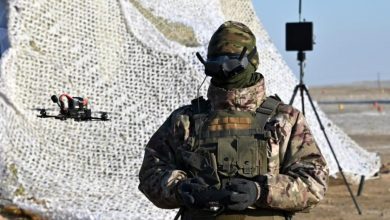Australia’s EOS showcases Apollo high-energy laser weapon

Australian defense company Electro Optic Systems (EOS) has unveiled a new high-energy laser weapon known as Apollo, capable of shooting down drones using a focused beam of light.
The system was featured this week on Network Ten’s Ten News Plus, where reporter Carrie-Anne Greenbank visited the company’s Canberra facility to explore how laser technology is reshaping the future of air defense.
According to the broadcast, the Apollo laser weapon represents a major step in Australia’s growing role in counter-drone defense. The report highlighted how the laser’s precision, instant engagement capability, and low operational cost are transforming how militaries can respond to swarming and unmanned aerial threats.
EOS Chief Executive Officer Dr. Andreas Schwer described laser technology as the next evolution in air defense, providing fast, repeatable, and cost-effective engagement against drones. “Laser technology is the next step in air defence, combining precision and speed with a significantly lower cost per engagement,” Dr. Schwer said during the segment.
The story also featured insights from Dr. Oleksandra Molloy of UNSW Canberra, who discussed how recent battlefield experiences — particularly the rapid escalation of drone warfare in Ukraine — have accelerated global demand for advanced counter-drone technologies. She noted that the lessons learned from real-world conflicts have underscored the need for scalable, adaptive defenses like those under development in Australia.
At its Canberra facility, EOS demonstrated how Apollo, integrated with its existing Slinger remote weapon system, forms part of a layered approach to counter unmanned aerial threats. While Slinger employs conventional kinetic interception, Apollo uses directed energy to disable or destroy aerial targets almost instantly once detected. Together, the systems show how Australian-made defense technologies are evolving to address new and unpredictable threats in the air domain.
The Ten News Plus report underscored that Australia is positioning itself as a regional leader in advanced defense technologies. By developing high-energy laser systems such as Apollo, EOS is aligning with a broader shift toward energy-based weapons that provide precision and operational efficiency without the need for traditional ammunition.
EOS said the laser weapon was developed in response to growing international interest in affordable, scalable, and sustainable counter-drone solutions. The company’s executives emphasized that directed energy weapons, once seen as experimental, are now maturing into deployable systems that can operate across military environments.
In a statement, EOS said its latest developments illustrate how innovation in laser and kinetic systems can strengthen layered defense and protect forces in modern combat conditions. “Australia’s leadership in laser defence was front and centre,” the company said, noting that technologies like Apollo are redefining how nations respond to the rising threat of unmanned systems.
In August 2025, Electro Optic Systems announced its first international order for a 100-kilowatt-class high-power laser weapon system, confirming the growing demand for its directed energy technologies. According to a company release issued at the time, a European NATO member state placed a €71.4 million (approximately $82 million) order for the system, which will be produced at EOS’s Singapore facility and delivered between 2025 and 2028.
As global militaries adapt to the increasing use of drones for surveillance and attack, systems such as EOS’s Apollo highlight how defense industries are racing to build faster, cheaper, and more precise countermeasures.





